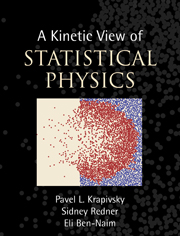Preface
Published online by Cambridge University Press: 05 March 2013
Summary
Statistical physics is an unusual branch of science. It is not defined by a specific subject per se, but rather by ideas and tools that work for an incredibly wide range of problems. Statistical physics is concerned with interacting systems that consist of a huge number of building blocks – particles, spins, agents, etc. The local interactions between these elements lead to emergent behaviors that can often be simple and clean, while the corresponding few-particle systems can exhibit bewildering properties that defy classification. From a statistical perspective, the large size of a system often plays an advantageous, not deleterious, role in leading to simple collective properties.
While the tools of equilibrium statistical physics are well-developed, the statistical description of systems that are out of equilibrium is less mature. In spite of more than a century of effort to develop a formalism for non-equilibrium phenomena, there still do not exist analogs of the canonical Boltzmann factor or the partition function of equilibrium statistical physics. Moreover, non-equilibrium statistical physics has traditionally dealt with small deviations from equilibrium. Our focus is on systems far from equilibrium, where conceptually simple and explicit results can be derived for their dynamical evolution.
Non-equilibrium statistical physics is perhaps best appreciated by presenting wide-ranging and appealing examples, and by developing an array of techniques to solve these systems. We have attempted to make our treatment self-contained, so that an interested reader can follow the text with a minimum of unresolved methodological mysteries or hidden calculational pitfalls.
- Type
- Chapter
- Information
- A Kinetic View of Statistical Physics , pp. xi - xiiiPublisher: Cambridge University PressPrint publication year: 2010



